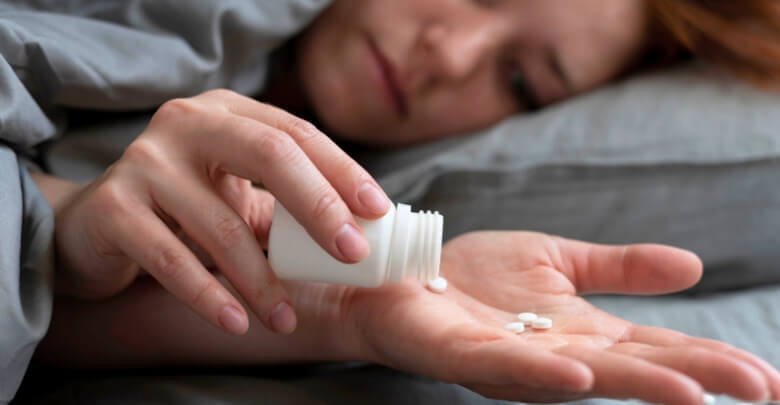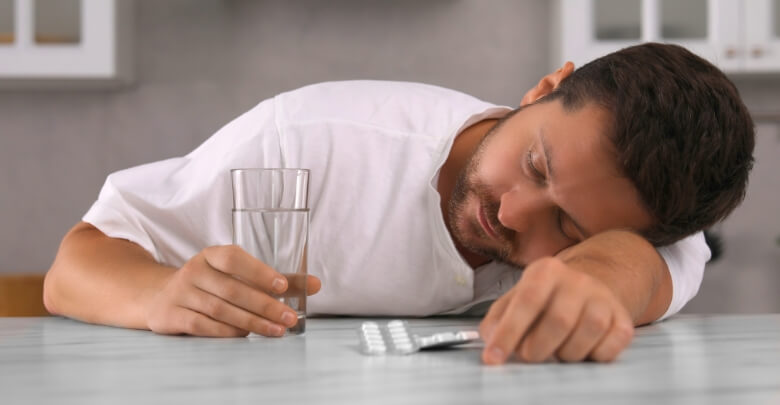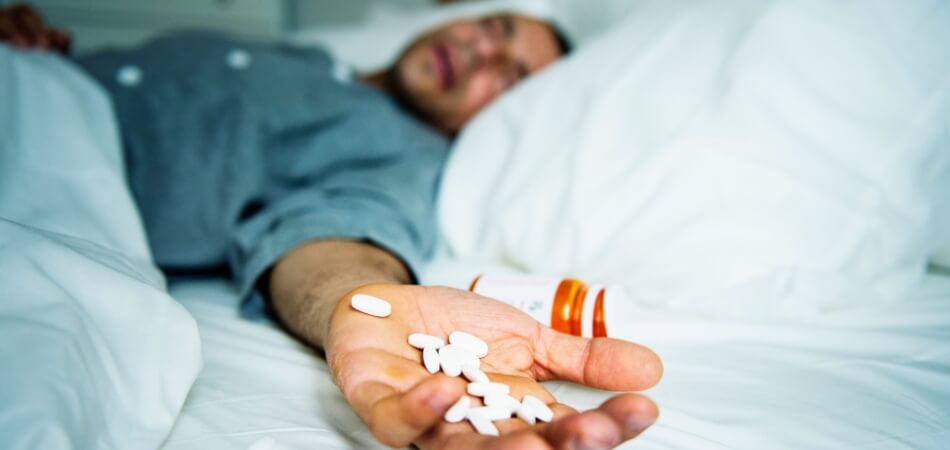Sleep disorders are alarmingly common, affecting millions worldwide, with many turning to sleeping pills for immediate relief. As sleep plays a fundamental role in maintaining health and well-being, the reliance on these medications is not surprising.
However, there’s a rising concern regarding the misuse and abuse of sleeping pills, prompting the question: Can you die from sleeping pills?
Yes, sleeping pills can kill, especially in overdose cases. An overdose can severely depress the respiratory system, lead to a coma, and be catastrophic if not adequately treated.
To understand more about the risks and safe practices surrounding sleeping pills, keep reading as we delve deeper into this critical issue.
Why Are Sleeping Pills Becoming Increasingly Popular?
Several reasons contribute to the popularity of sleeping pills. Stressful lifestyles and the pressure to meet personal and professional demands can make winding down at night challenging. As sleep becomes elusive, sleeping pills offer a quick solution. Additionally, shifts in work hours and insomnia frequently contribute to their rising use.

Widespread use of screens and gadgets late into the night also plays a significant role. Exposure to blue light from devices can disrupt the natural sleep cycle, making it challenging to fall asleep naturally. In this context, some feel they have no choice but to take sleeping pills.
However, it’s worth exploring alternatives that might not have the same side effects as sleeping pills. The use of gadgets like Chill Pill, which promote relaxation and improve sleep quality, can be a safer and more natural way to induce sleep. It works without pharmaceuticals. This approach offers a way to address sleep challenges without sleeping pills.
Can You Overdose on Sleeping Pills?
Yes, you can overdose on sleeping pills. Excessive use of the prescribed dosage can lead to severe health complications, including life-threatening situations. The following are the situational factors that need to be addressed.

Exceeding the Recommended Dose
People often take more pills hoping for a quicker or deeper sleep. This can potentially lead to an accidental overdose. Immediate medical attention is of utmost importance in such cases.
Combining with Alcohol or Other Drugs
Alcohol increases sleeping pills’ sedative effects. Mixing the two can dangerously enhance their impact, leading to an overdose. This combination is common and highly risky.
Tolerance Buildup
Regular use of sleeping pills may increase tolerance. Users might consume more to achieve the same sleep-inducing effect. This escalation can lead to overdose.
These scenarios underline the importance of adhering to prescribed dosages and knowing the potential risks associated with sleeping pills.
Can You Die from Sleeping Pills?
The safety of sleeping pills is a concern, especially since they have become increasingly popular as a means of managing sleep disorders. The question ‘Can you die from sleeping pills?’ is not just alarming but also necessary to explore given their widespread accessibility and use.

Indeed, while these pills can be effective when used correctly, they carry significant risks if misused or abused. Overdose is possible and can be lethal, which underscores the importance of using them responsibly and carefully.
Identifying Overdose Risk
Sleeping pills slow down body functions, causing sleep. Exceeding the recommended dosage can suppress critical bodily functions. This often leads to severe respiratory depression, which if not treated immediately, can be life-threatening.
Doctors always advise using the lowest effective dose to mitigate these risks. Even a small increase in the dosage can result in profound changes in how these drugs affect the body. It’s essential to follow the prescription exactly as it is written to avoid tragic consequences.
Interactions with Other Substances
Mixing sleeping pills with other substances like alcohol or opioids multiplies their sedative effects. This dangerous combination can lead to demise without warning. Many are unaware of how fatal this mix can be until it is too late.
Healthcare providers should be informed about all the medications you take is imperative. They can guide safe practices and warn against hazardous combinations. Awareness and education on this topic can save lives by preventing dangerous interactions before they occur.
Signs and Symptoms of Sleeping Pill Abuse
Regular use of sleeping pills can lead to dependence and addiction. This creates a dangerous cycle where more pills are needed to achieve the same effect. Recognizing abuse signs can help prevent an overdose.
Common signs include using sleeping pills beyond the prescribed period or shopping around for multiple prescriptions. If you notice these behaviors in yourself or others, seek professional help. Addressing these issues early can prevent overdose and death.
For more detailed insights into the safety of various health and hygiene tech gadgets, including sleep aids, visit the Info Gadgetians website. Their extensive reviews offer valuable information that can help you make informed decisions about using such technology safely and effectively.
Preventive Measures and Safe Use
The first step to safe use is to educate yourself about sleeping pills’ potential risks. Always consult a healthcare professional before starting a new medication. This ensures its safety given your specific health circumstances.
It is also wise to explore alternative methods of managing insomnia, such as lifestyle changes or therapy. Non-pharmacological interventions can improve sleep without drug risks.
Monitoring and regular check-ins with a doctor can help manage sleeping pills use safely. They can adjust dosages or recommend different treatments if necessary, avoiding overdoses.
Although sleeping pills are effective for sleep disorders, their misuse holds serious risks, including fatal overdoses. Adhering strictly to medical guidance, being aware of potential interactions, and recognizing abuse signs are imperative.
Pill-Related Incidents and Overdoses: What Are the Statistics?
Overdoses and incidents related to pills are significant public health concerns. The incidents typically involve misuse or accidental ingestion of medications, leading to adverse health effects, emergency room visits, or even fatalities.

As people search for quick solutions to health issues like sleep disorders, such incidents become more likely. It’s imperative to grasp the scale of this issue to foster better awareness and prevention strategies.
Statistical Summary of Pill-Related Incidents
Overdoses caused by pills, particularly opioids and sedatives, are the leading cause of drug overdose deaths. In recent years, these incidents have escalated, reflecting broader trends in prescription drug abuse. Data shows a sharp increase in hospitalizations due to overdoses.
Every year, emergency rooms report thousands of cases in which patients suffer complications as a result of medication misuse. Most of these cases are preventable with better medication safety education. Awareness campaigns are vital to reducing these statistics.
Analysis of Overdose Trends
The age group most affected by pill-related overdoses is adults between 25 and 50. This demographic frequently deals with chronic pain or sleep issues, leading to higher medication use. Monitoring and intervention programs targeted at this group could reduce incident rates significantly.
Seasonal variations also show higher overdose rates during the winter months. This could be related to increased feelings of isolation or depression during this time, leading people to misuse medication. Community support and outreach are critical.
Interestingly, there’s a growing concern about taking sleeping pills with juice, which can alter drug absorption and effectiveness, sometimes increasing overdose risks. This seemingly benign action needs more public awareness to prevent unintended overdoses.
Based on these statistics and the factors influencing them, communities and healthcare providers can better target prevention and treatment efforts. Pill-related incidents will be reduced.
Seeking Help: What to Do in An Emergency?
Life and death depend on knowing what steps to take during an emergency. Regardless of whether it is a medical issue, an accident, or any other urgent situation, it is imperative to act quickly and informed.
In emergencies, especially involving health crises like overdoses or severe injuries, time is of the essence. Take these steps if you or someone else finds themselves in a critical situation.
- Call Emergency Services Immediately: Dial 911 or your local emergency number without hesitation.
- Stay Calm and Clear: Provide clear, concise information to the dispatcher.
- Do Not Move the Injured: Unless they are in immediate danger, do not move them.
- Perform Basic First Aid: If trained, administer CPR or stop bleeding until help arrives.
- Gather Essential Information: Note any medications the person is taking and any known allergies.
- Keep the person warm: Use blankets or clothing to keep them warm.
- Stay by Their Side: Offer reassurance and monitor their condition continuously.
- Follow Dispatcher Instructions: They may guide what to do before emergency responders arrive.
The outcome of an emergency can be significantly impacted by your actions. It’s imperative to remain composed and follow these steps to ensure everyone’s safety and well-being.
FAQs About Can You Die from Sleeping Pills?
There are several common concerns associated with sleeping pills that need to be addressed when discussing the risks. Here are seven frequently asked questions on the topic:
What Makes Sleeping Pills Dangerous?
Sleeping pills can depress the central nervous system, leading to decreased breathing, heart rate, and ultimately, if severe enough, death.
Are Some Sleeping Pills Safer than Others?
While all sleeping pills carry some risk, non-benzodiazepine sleep aids are generally considered safer than benzodiazepines due to their lower potential for dependence and overdose.
Can Natural Sleep Remedies Be Safer?
Natural remedies such as melatonin or valerian root may offer safer alternatives for some people, though effectiveness varies, and consulting a healthcare provider is recommended.
How Can You Minimize the Risks of Sleeping Pills?
Always follow the prescription guidelines, avoid alcohol, monitor your health conditions, and consult regularly with your healthcare provider about your sleep medication.
Closing Idea
Even though sleeping pills can help manage sleep disorders, misuse comes with serious risks. The answer to “Can you die from sleeping pills?” is unfortunately yes, especially in cases of overdose or when combined with other substances like alcohol.
It’s critical to follow medical advice, use prescribed dosages, and be vigilant about abuse signs. Alternatives such as lifestyle adjustments and natural sleep aids should be considered to minimize medication dependence.
To ensure that sleeping pills are used safely, one should remain informed and cautious to ensure they are as beneficial as possible.






